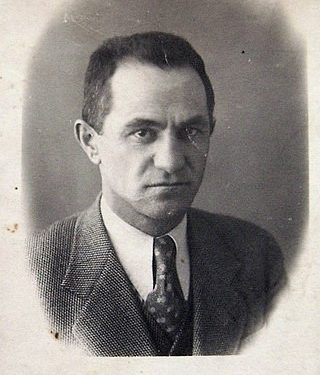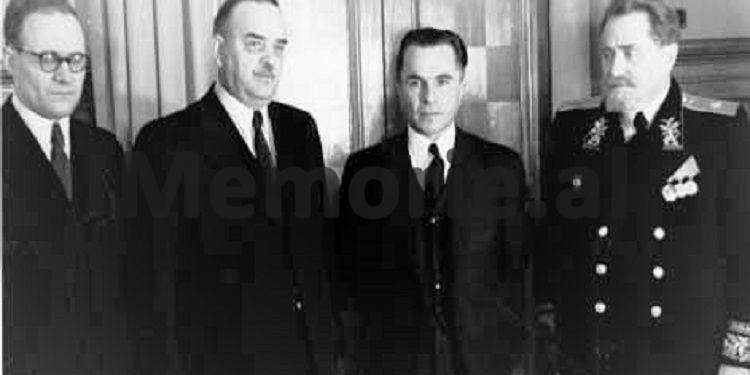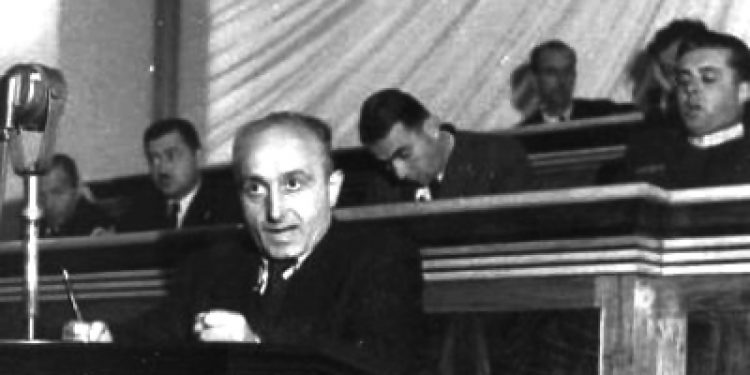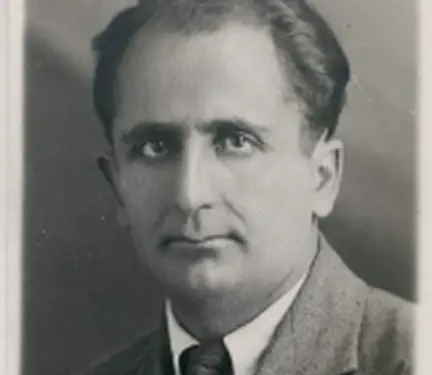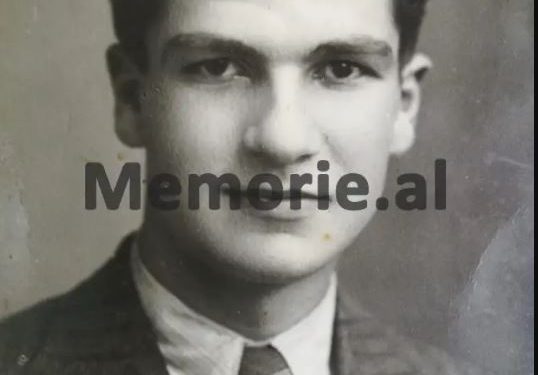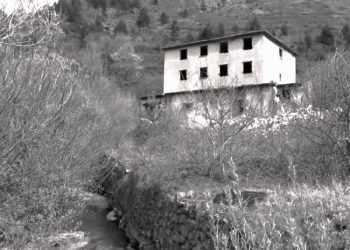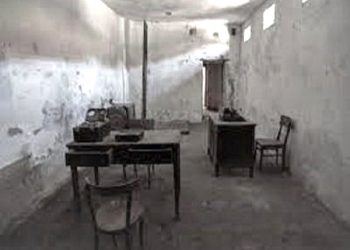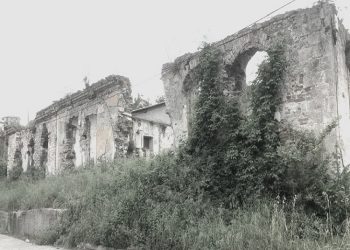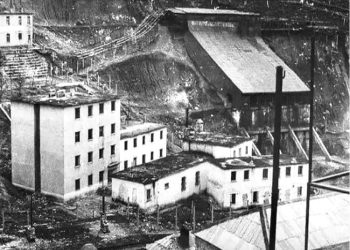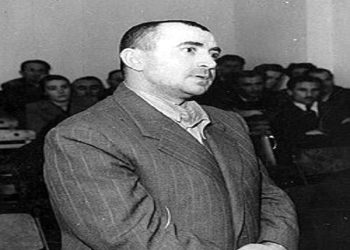By Prof. Muslim Islam
The first part
-Enveri had lied about the meeting with Ali Kelmendi-
Memorie.al / I feel it is my duty as a citizen to give the reader a presentation or an explanation about the reasons that led me to add this afterword to the monograph, dedicated to the life and work of Ali Kelmendi. As I informed you in the introduction, I wrote this monograph during the 80s of the 20th century. In March of 1987, I finished the book and submitted it to the editors of the “8 November” Publishing Company. After several months, I learned that the reviews had been formulated with appreciation by three renowned specialists, and yet, I did not understand why the material was not given for editing and why the process of preparation for publication had not yet begun. I had submitted, along with the text of the monograph, photos, documents, as well as the cover. In those days, someone very kindly whispered to me that the material had been withdrawn to the Central Committee of the Labor Party of Albania. But maybe this benefactor didn’t know or didn’t have the courage, I don’t know, to tell me in which sector it was left, or which holder had it in hand. God, even today, in the years of democracy, wants to remain anonymous…!
Why didn’t they publish Ali Kelmendi’s monograph?!
The matter, it seemed, was conspiratorial, and without their consent, the editors could not schedule it for publication. After many months or after a year, I was called to the editorial office by order of the director of the publishing company and they asked me for many explanations, questions and doubts. They asked for the answers in writing, that they would be sent up. They had suggested that paragraphs be removed, entire pages, and they specifically requested that the platform, Kelmendi’s birthplace, Kosovo and its history, be shortened.
One of the requests that surprised me and made me nervous after that many years of commitment, after the completion of the monograph, was to present it as if it had been worked with the co-author, the candidate of the Political Bureau, comrade Pilo Peristeri. In their remarks, the “comrades” of the PPSh Central Committee insisted that the figure of Enver Hoxha occupy a special place and his writings about Ali Kelmendi should be at the center of the references.
From all the documentation of the time, it did not appear to me that Enver Hoxha had ever met Ali Kelmendi. How should I act? It was not easy! I decided to hold the material for a long time, in my hands…! The years of the democratic turn, they found the book in the printing house, after they had given it to two other professors for review.
The editor was Sami Çabej, whom I chose myself, as a friend I had, but also because he had edited the monograph dedicated to Vasil Shanto. The “8 November” printing house started the layout, and the illustration apparatus had been sent to the large printing house, because there were more specialized departments for photos, facsimiles and covers.
In those days of fighting, when the dictatorship was overthrown and when the wave of changes, revolutions, and revisions created uncontrolled situations and unpleasant events for many institutions and enterprises, I was pushed to do the impossible, to withdraw the book from the printing press. In the typography, all the illustrative material had disappeared and none of the Directorate and the department were able to give me explanations!
Of course, the despair in these cases is great, because they were values; I had done a very tiring and expensive job, visiting and researching all the cities and centers where Ali Kelmendi had lived and worked, meeting with as many comrades of Kelmendi, friends and acquaintances and in many cases , with their families, because some did not live, or continued their sentences in prisons and concentration camps.
Only abroad I was not allowed to research archives, or to meet with anti-fascists and revolutionaries, because, according to the officials of the Ministry of Education and Culture, “Comrade Enver told everything about Ali Kelmendi. We do not consider it reasonable to undertake research abroad”. Fortunately, I had photographed some of these documents and I am bringing them to the book, thanking all Kelmendi’s comrades-in-arms, who showed feeling, even, some turned into researchers, just for the sake of making this monograph as complete as possible.
There is no bad story, but true and not true
This judgment and principle has been primary in all my research work. The realization required great effort; communication skills with interlocutors, special preparation for each meeting, question and above all, honesty and courage were required. During the collection of the material and the drafting of the monograph, I have tried to get as close as possible to the truth in dealing with the situation, events and the very life of Ali Kelmendi’s work.
Monograph does not mean photography. The important thing is the interpretation of the documents. To date, no apparatus has been invented to verify how truthful the interlocutor is in what he remembers. Their memories and stories and, to a certain extent, even in a small percentage, there is subjectivity in the documentation, because people have conceived them as well.
This reason, and rather another truth, which I will clarify below, led me to prepare this epilogue, because the triumph of democracy and the invalidation of the totalitarian system and Enverian dogmatism helped me. We cannot fail to assert that all readers have the opportunity to see the archives or the younger generations, who did not live the 50-year dictatorship, to understand the falsifications and embezzlements that have been made to the History of Albania. The publication of the documents would give the reader a clear understanding, so that everyone could make an independent judgment about events and individuals.
The life of Ali Kelmendi
Ali Kelmendi, like all young people in the 20s-30s of the 20th century, jumped into the wave of events that Albania and the nation’s territories were going through outside the state border. He was forced to interrupt his studies in Austria, in Vienna, for psychology, because Austria, being on the side of the coalition that lost the First World War, had to face difficult political and economic periods. In these circumstances, Ali Kelmendi returns to Peja, near his family.
He found his family and Kosovo in a very difficult situation. The Serbian army was carrying out unprecedented massacres and operations. In these conditions, Ali Kelmendi jumped into the mountains and started the armed struggle against the Serbian chauvinists. He was soon forced to cross the border and place himself next to the most vocal men of the nation, which for the formation of Ali Kelmendi, as he himself said, was a more important university. From Bajram Curri, the “Elder of the Mountains”, who was like a piece of rock detached from the Alps and which had in itself properties and virtues, Kelmendi absorbed the wisdom of the leader.
From men full of knowledge and culture, like; Bedri Pejani, Hasan Prishtina, Ibrahim Gjakova and others touched Albanian patriotism. Ali Kelmendi, well-bred, was described by others as a man. He, from what he heard and what he touched, created the awareness of the truth of the non-existence of borders between Albania and Kosovo and that there would be no force to stop the unification of the Albanian lands. He quickly lined up on the side of Avni Rustemi, Halim Xhelos, Sejfulla Malëshova, Haki Stërmilli and dozens of other young democrats of the “Bashkimi” organization, of which Ali Kelmendi also became a member.
The course of events, a little later, recognized and connected him with other prominent men of democracy and Albanian culture, such as Fan S. Nolin, Luigj Gurakuq, and others. My aim in this life and work of Kelmendi is to give every trace in its time, the weight and value that it had for Albania, the constellation of young people, like Ali Kelmendi, who opposed the external chauvinism and fascism that were being brought out “horns” that were weaving their web or extension in Albania like a spider.
They also opposed the Monarchy, which was weighing the interests of the nation as much as with Belgrade and Athens and, at the end, with Rome, which was taking root with capital and espionage and which was grabbing it by the throat and thus, returning it Albania in an undeclared colony.
The Central Committee ordered that the materials not be made available to me
Another reason that prompted me to write this afterword is a fact that I learned in May 1993, exactly ten years after the beginning of work on the monograph, which angered and depressed me beyond measure. A “piece of paper”, which I read myself and which today is in the Central State Archive (A.Q.SH), where the documents of the former Archive of the Party of Labor of Albania (A.Q.P.), with which the former leaders have already passed of the PPSh Central Committee had given a clear order to the former head of the AQP, not to make available to me all the documents they had about Ali Kelmendi, or that were related to the life and work of this personality.
I believe it is too much; to break down their opinion about what was bothering them. What drove them and what scared them? It is understood that I, as a researcher, without knowing at that time the specific order, cannot forget and I have no reason not to affirm it: how tired I was, how desperate I was, how nervous I was when I was sent away empty-handed; when they served me irrelevant materials, when they covered me with phrases and whole pages, when they eavesdropped on me or stood over my head, and even more so, when they kept my files for verification and when they covered paragraphs, names with ink , events and entire pages. That insidious service, that order, which has nothing in common with scientific requirements, and which killed the researcher, since in this way, science could not be done, took away the great concern, the honesty, because regardless of the point of view, the truth must remain true, because otherwise, premeditation leads the researcher to treat the phenomena, events, personalities, not as they result, but as his convictions require, or as they want to unfairly dictate to him, others with intentions cruel.
I can’t forget, I was surprised when I heard the answer of the archivists repeated: “…Okay, you’re good, you’re persistent, but they’re secret documents…! They are documents of the ‘Reserve Fund’, they are conspiratorial”. Now that the original documents are being published, more and more so-called “secret” materials are coming to light, which they did not provide, and they push the researcher to inaccurate conclusions and judgments.
The reader can rightfully expect an answer to the question that may arise. Why is this Monograph, which was awarded a prize in the national competition, prevented from being published? I will present the answer to this question below, but first I would like to inform the readers and especially the young people. Now, what makes me insist on publishing this monograph?
First, I have indisputable conviction that Ali Klemendi had a great patriotic spirit and made unimaginable sacrifices for freedom, independence, territorial integrity, democracy and for social solutions and development.
Secondly, the danger of fascism continues even today, in modern times, even in economically powerful states and nations.
Thirdly, to understand the distortions, falsifications and misinterpretations that were made by Enver Hoxha, in his works and in the History of the ALP and, therefore, from the entire Albanian historiography, the figure and work of Ali Kelmendi, the constellation of events of his time. Time is the best indicator. Figures like that of Ali Kelmendi do not die.
This is not the place to list what many supporters of Enverism have stated and written in their memoirs, who had filled entire rooms with their belongings, which they called archives and which occupied half a floor in the headquarters of the Central Committee. Guys like Sevo Tarifa and Sulo Gradeci were exemplary.
The first, every October, the month of Enver’s birthday, read lectures in schools and enterprises filled with the words: “Legendary commander”, “Architect”, “Classic”, “Great Marxist-Leninist” and expressions that demanded applause; “The mountains before him were low”, “The sun before him shone less”.
Nexhmija, who led Enver’s cult
Photos were multiplied, albums were made, articles were made every day in the “Voice of the People” that otherwise, Nexhmija was shocked. Currency poured in for the works in the series, so that Vladimir Ilyich Lenin could pass them.
All publications were put in front of journalists, screenwriters, directors, composers, painters, sculptors and even those who embroidered, carved, knitted with silver threads or wrote his name with stones on the slopes of the mountains. Even in prisons and concentration camps, quotes and his name were written, and political prisoners and opponents were forced to read and review Enver’s works.
Nexhmije Hoxha had some well-known, but also unknown functions. Without her consent, no step was taken. A whole network of Security people brought her opinions and carried out special missions, on her direct orders. As the director of the Institute of Marxist-Leninist Studies, she was entrusted with the keys like the storekeeper, the keys to ideology, to history and to everything the classic wrote.
Nexhmija had a specific task; it was the weight of the senior cadres of the Political Bureau itself. For every high-level party meeting, plenum or congress, she and only she appointed the presidium until their alignment, that is, who is on the left and who is on the right of Comrade Enver.
He followed the press, television and every activity with the aim of how and how many times Comrade Enver was mentioned, quoted or appeared on the screen. He had to be in command. If it happened that two or three days passed and his name did not appear or was not mentioned, he urgently called the chief editors, the directors of the relevant institutions, and created an alarm.
He quickly improvised, even a visit to the Art Gallery, where Enver was surrounded and followed with open mouths by the “cream” of art, literature, culture and science, just to keep the psychosis alive in the people, that; he and only he, directed and decided, that only he and only he, illuminated and warmed.
How did Enveri get his nickname, famous people?!
It is also known that Enver Hoxha, in different periods and years, when the situation required, gossiped, ridiculed or attached nicknames to many prominent people and in the strangest ways.
Without scruples he has slandered; Nolin, Konica, Fishta, Mit´hat Frashëri, Sejfulla Malëshova, Hasan Reçi, Zef Malë, Dhimitër Fallon, Andrea Plasar, Kostandin Bošnjakun, Omer Nishanin, Vasil Shanton, Anastas Lulon, Ymer Dishnica, Sadik Premten, Tuk Jakovë, Hysni Lepenica, Skënder Muçon, Koço Tashko, Bedri Spahiun, Tahir Kadarenë, Stefo Grabockën and even Qemal Stafa and Nako Spiru.
And the list of insults was added until he died. It is enough to see the plenums and congresses, even after death, to understand the number of crimes and the complete list of names. This speaks squarely about his soul, of a bully, a detractor, a cynic and a megalomaniac.
Hoxha’s monstrous punishments
From 1941 to 1970, Enveri expelled 30,000 party members. Of the 21 members and candidates of the Central Committee of the Albanian Communist Party, who led the war, 19 were expelled, imprisoned or shot.
Of the first 7 members of the Provisional Central Committee of 1941, 6 of them were shot, imprisoned or killed. Of the 80 leading cadres of the main formations of the Anti-Fascist National Liberation Army, over 60 have been shot, imprisoned or expelled.
It is enough to familiarize yourself with the materials of the Second Plenum of Berat, the Fifth and Eighth Plenums and in the palm of your hand; you will be given the framework and black deeds of Enver Hoxha. His portrait, from the school in Gjirokastër, to the Lyceum of Korça and all the way to France, has been convincingly brought to him by his friend Foto Bala, a well-known intellectual.
Why was his scholarship in France cut off by the Minister of Education, Marash Ivanaj, for the sole reason of not taking the exams, this patriot and great thinker died in prison. Knowing what Musine Kokolari, his brother Isa Kokolari or the intellectuals Nexhat Peshkopia, Fejzi Dika, Nonda Bulka, Mentor Çoku, Babameto wrote, you are ashamed and wonder how he came to be at the head of the war and the state.
What has been written by Sejfulla Malëshova, Ymer Dishnica, Skënder Luarasi, Omer Nishani, Mustafa Gjinishi, Koço Tashko, Nako Spiru, Tuk Jakova, Bedri Spahiu, Liri Belishova, Justina Dishnica, Drita Kosturi, Sotir Vullkani, Stefo Grabocka, Kiço Njjela, Kasëm Trebeshina and if it continues, the list is endless and those we mentioned are some of the closest witnesses to the life of his black work. Memorie.al
The next issue follows




